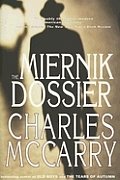Charles McCarry's The Miernik Dossier
 I’m reading another spy novel by former deep cover CIA agent Charles McCarry (see earlier blog on Old Boys) – it’s actually his first one: The Miernik Dossier, published first in 1973. It takes place in about 1959, and , roughly, it’s about a group of Geneva, Switzerland-based spies of American, British, French, and Polish nationalities, along with a six feet, eight inch-tall Sudanese Muslim prince named Kalash el Khatar, a character who appears in McCarry’s most recent book, Old Boys, set more than 40 years later.
I’m reading another spy novel by former deep cover CIA agent Charles McCarry (see earlier blog on Old Boys) – it’s actually his first one: The Miernik Dossier, published first in 1973. It takes place in about 1959, and , roughly, it’s about a group of Geneva, Switzerland-based spies of American, British, French, and Polish nationalities, along with a six feet, eight inch-tall Sudanese Muslim prince named Kalash el Khatar, a character who appears in McCarry’s most recent book, Old Boys, set more than 40 years later. In this story, some of the agents, none of whom will admit to each other his agent-hood, accompany el Khatar on a trip to deliver a new Cadillac to his father in Sudan. This is but a pretense for lots of intrigue – naturally – both within the novel and on a plot-level.
There’s a strange scene halfway through the book where the group is having dinner in Verona, Italy (home, if I’m not mistaken, to the Romeo and Juliet saga). There’s a group of Germans at the next table, and they’re acting superior. “Waffen SS,” says the British agent to the American one. “Returning to the happy scenes of wartime duty.”
A violinist who our group identifies somehow as a concentration camp survivor entertains the German table. The Germans treat him in a way that reminds me of former Southern American slave owners to free blacks in other stories: he’s a minstrel to them, and sadly, the violinist plays the part eagerly.
Tadeusz Miernik, the Polish (probable) spy the book is named for, is not amused:
Miernik’s chair went over backwards. He was standing and speaking to the Germans. He held a table knife in his hand. The Germans stood their ground, either astonished by this display of bad manners or unfrightened by a one-armed man [Miernik wore a cast] with a dull knife. One of the German women carried a Pekingese in her arm; throughout the meal and the violin concert she had been feeding it and talking to it.Upon which the Germans leave, the dog lady sobbing, and Miernik pours more wine for his friends. It’s the strangest scene. The irony is completely lost on the Germans.
“One moment,” Miernik said. “I want to kill your dog.” The woman shrieked, and a lok of real horror came into her eyes. Her husband stepped between the dog and Miernik. “You are drunk,” he said.
“Quite sober,” Miernik said. “Hand over the dog. We have been watching you and we have our orders. The dog must die.”
The German turned on his heel and began to herd his friends toward the door. “Halt!” Miernik shouted. “Come back or I shoot.” The Germans stopped and turned around again—all except the woman with the dog. She now had both arms around the animal. She stared at Miernik over her hunched shoulder. “You are insane,” she cried.
“How long have you been hiding this dog?” Miernik asked in the loud German he was speaking. “Speak up—and remember there are witnesses present.”
“Who are you,” asked the German. “You are not a German.”
“My name does not matter. It is enough that you know that I am an officer in the Dog Death Brigade. You have forgotten that dogs are not human beings. They are dogs. Dogs. Dogs who are shitting on our sacred soil, taking food from the mouths of good human children.”
The violinist looked from Miernik to the Germans, and his giggle changed to a spasmodic, snorting laugh. He had heard this sort of talk somewhere else. With his hand over his mouth, he scuttled away, the thousand-lira note [a tip from the Germans] fluttering to the floor behind him.
“If you did not have that arm in a sling,” the German said, “I would slap your face for you.”
“I don’t doubt it for a moment,” Miernik said. “Your late leader, Reichsführer Himmler, would do practically anything to protect a dog. He may be dead, but the kingdom of his ideas lives on. Take your dog and go. But remember: one day soon the gutters will run red with the blood of dogs.”


0 Comments:
Post a Comment
<< Home